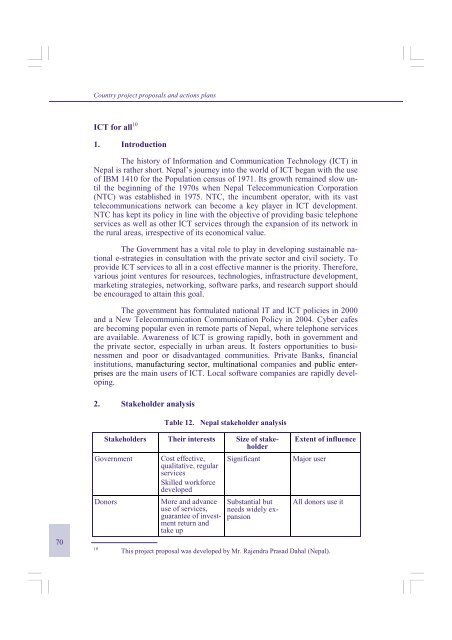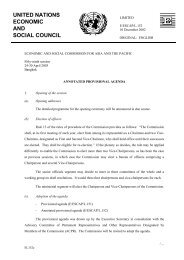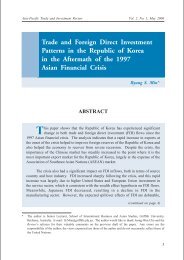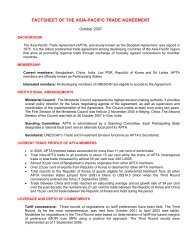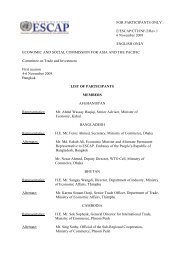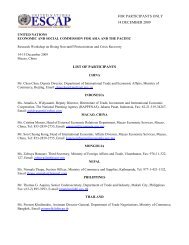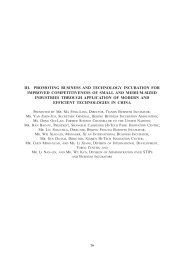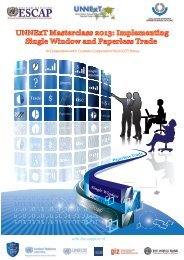Report of the Regional Workshop - Escap
Report of the Regional Workshop - Escap
Report of the Regional Workshop - Escap
Create successful ePaper yourself
Turn your PDF publications into a flip-book with our unique Google optimized e-Paper software.
Country project proposals and actions plans<br />
ICT for all 10<br />
1. Introduction<br />
The history <strong>of</strong> Information and Communication Technology (ICT) in<br />
Nepal is ra<strong>the</strong>r short. Nepal’s journey into <strong>the</strong> world <strong>of</strong> ICT began with <strong>the</strong> use<br />
<strong>of</strong> IBM 1410 for <strong>the</strong> Population census <strong>of</strong> 1971. Its growth remained slow until<br />
<strong>the</strong> beginning <strong>of</strong> <strong>the</strong> 1970s when Nepal Telecommunication Corporation<br />
(NTC) was established in 1975. NTC, <strong>the</strong> incumbent operator, with its vast<br />
telecommunications network can become a key player in ICT development.<br />
NTC has kept its policy in line with <strong>the</strong> objective <strong>of</strong> providing basic telephone<br />
services as well as o<strong>the</strong>r ICT services through <strong>the</strong> expansion <strong>of</strong> its network in<br />
<strong>the</strong> rural areas, irrespective <strong>of</strong> its economical value.<br />
The Government has a vital role to play in developing sustainable national<br />
e-strategies in consultation with <strong>the</strong> private sector and civil society. To<br />
provide ICT services to all in a cost effective manner is <strong>the</strong> priority. Therefore,<br />
various joint ventures for resources, technologies, infrastructure development,<br />
marketing strategies, networking, s<strong>of</strong>tware parks, and research support should<br />
be encouraged to attain this goal.<br />
The government has formulated national IT and ICT policies in 2000<br />
and a New Telecommunication Communication Policy in 2004. Cyber cafes<br />
are becoming popular even in remote parts <strong>of</strong> Nepal, where telephone services<br />
are available. Awareness <strong>of</strong> ICT is growing rapidly, both in government and<br />
<strong>the</strong> private sector, especially in urban areas. It fosters opportunities to businessmen<br />
and poor or disadvantaged communities. Private Banks, financial<br />
institutions, manufacturing sector, multinational companies and public enterprises<br />
are <strong>the</strong> main users <strong>of</strong> ICT. Local s<strong>of</strong>tware companies are rapidly developing.<br />
2. Stakeholder analysis<br />
Table 12. Nepal stakeholder analysis<br />
70<br />
10<br />
Stakeholders Their interests Size <strong>of</strong> stakeholder<br />
Government<br />
Donors<br />
Cost effective,<br />
qualitative, regular<br />
services<br />
Skilled workforce<br />
developed<br />
More and advance<br />
use <strong>of</strong> services,<br />
guarantee <strong>of</strong> investment<br />
return and<br />
take up<br />
Significant<br />
Substantial but<br />
needs widely expansion<br />
Extent <strong>of</strong> influence<br />
Major user<br />
All donors use it<br />
This project proposal was developed by Mr. Rajendra Prasad Dahal (Nepal).


